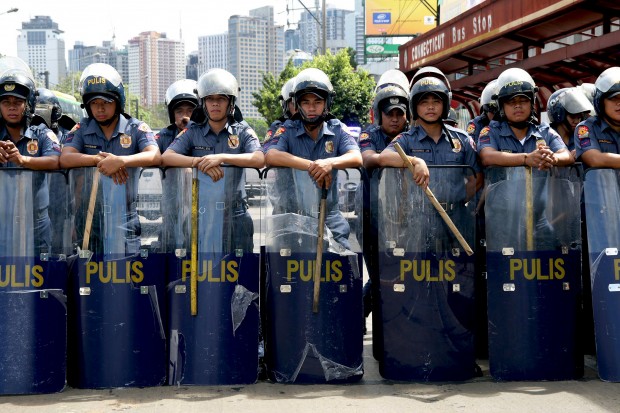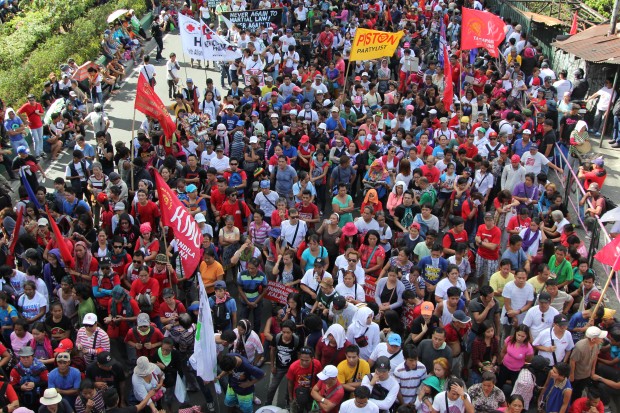By Luis V. Teodoro
Living in the Philippines has always been challenging and difficult for many Filipinos. But never since the Marcos dictatorship has it been more dangerous than today for Lumad, dissenters, women, human rights defenders and the poor.
In response to life’s daily perils, some 20 percent of the population — or roughly 20 million men and women of the over 100 million residents of these isles of uncertainty — want to leave. These numbers are in addition to the nearly 11 million Filipinos scattered all over the globe from Angola to Zanzibar, of whom 47 percent are permanent immigrants, and 43 percent Overseas FilipinoWorkers (OFWs), according to data from the Philippine Overseas Employment Administration (POEA).
But it isn’t just construction workers, seamen, nannies, and domestics who’re heading for the nearest airport — and who were most likely among the thousands whose flights were canceled or delayed because of the 38-hour shutdown of the Ninoy Aquino International Airport (NAIA) last weekend.
Engineers, doctors, nurses, teachers, even lawyers and other professionals are also among them. In the mid-1980s, the surge in the number of Filipinos leaving for alien shores alarmed those who saw in the exodus the irreparable loss not only of the brains but also of the brawn that are both crucial to the country’s development.
In the 1990s, the alarm turned into condemnation of those abandoning the country of their birth, accusing them of being unpatriotic and of being solely focused on earning as much as they could.
The critics ignored the fact that for many OFWs, working in another country had become, and still is, a matter of survival, there being hardly any job opportunities at home that would assure them and their families lives of dignity in a society that over the decades has become more and more impoverished.
As for professionals, some do leave in search of relative luxury abroad. But others are also in search of the certainty, order and predictability of life that are absent in the Philippines, which in their minds would assure their children brighter futures. The meritocracy that governs the professions and trades in developed countries — the system based on the principle that what you know rather than who you know should decide personal advancement — is also among the lures of emigration. Filipinos generally excel in other climes, thereby proving that it is the system they’re born into that hinders both their advancement and the realization of their potentials.
The long and the short of it is the common conviction that being elsewhere is preferable to being here. “Here” is the Philippines, where, despite its having been under fascist rule from 1972 to 1986 and being once again under a despotic regime, the trains still don’t run on time. (The trains’ supposedly being on time, the fascist government of Italy’s Benito Mussolini claimed during World War II, was symbolic of the efficiency of the dictatorship.)
The Philippines is instead rapidly turning into a total disaster, a metaphorical train wreck whose brutal reality is pushing even more and more Filipinos into leaving for whatever country will accept them as workers or immigrants — or at least enable them to evade being deported as undocumented aliens.
TRAIN, the Tax Reform Acceleration and Inclusion law and the unprecedented surge of inflation in its wake that has almost literally made prime commodities worth their weight in gold, are not the only components of that wreck. Above it all is the gross inefficiency, incompetence, corruption, violence, and sheer madness that’s endemic in what passes for governance today.
The monopoly of a handful of families since Commonwealth days, political power has been used to keep those few in pelf and privilege in the seven decades since their United States patron recognized Philippine independence in 1946. Every administration since then has been run by the dynasties earlier “trained in self- government” by the US colonial regime and later nurtured and protected by their US patrons. Every one of them has been committed to keeping the country the way it has always been for over a century: a backward agricultural country and a US economic, political, cultural and military dependency.
Rather than address the poverty and its attendant ills rooted in the semi-feudal and semi-colonial character of Philippine society, they use and have always used State violence and repression against the movements, individuals and groups that have tried to work for the changes that have eluded this country and its people for centuries. The rebellions, uprisings and revolutionary wars that have haunted Philippine society for over 300 years are the consequences of both the reality of poverty and injustice as well as of the repression the ruling cliques — whether Spanish, American or Filipino — have used in response to the demand for the democratization of political power.
Since its collapse, the Marcos terror regime (1965-1986) had seemed the worst expression of the dynasts’ limitless appetite for power and plunder. But at least two of its successor regimes have come close to challenging that dictatorship’s dubious distinction.
The Macapagal-Arroyo regime (2001-2010) tried, but despite its sordid human rights and scandal-ridden record, didn’t quite make it as a Marcos regime clone during the near-decade it was in power. Instead, it is the current regime that in the brief span of twenty-five months is well on the way to becoming a worse version of the Marcos kleptocracy.
Not only has his regime amassed a record of human rights violations way above that of Ferdinand Marcos’ 19-year occupancy of Malacanang. President Rodrigo Duterte is also presiding over the complete return to power of the Marcoses via the siblings “Imee” and “Bongbong” and their unrepentant kin and cronies. In patent violation of the Constitution, Mr. Duterte has gone as far as to express his preference for the latter rather than for Vice President Maria Leonor “Leni” Robredo to succeed him should he resign, and to even invite a military junta to seize State power to prevent a Constitutional succession.
But it’s far from surprising. The regime’s lawlessness and contempt for the Constitution are by now close to the stuff of legend. The Duterte police force, acting above the law and with total impunity, has slaughtered thousands including women and children in the course of the selective “war” on illegal drugs, and arrested and detained thousands more for such “offenses” as loitering, some of whom have been killed while in custody.
Should he survive the remaining four years of his term, Mr. Duterte is likely to be prosecuted before the International Criminal Court (ICC) for crimes against humanity. But before the advent of that moment of historical retribution, the regime war against the poor and the future is continuing to ravage entire communities.
The debasement of democratic discourse he has achieved through his rants, profanities, ravings and encouragement of hate speech and the use of State violence against dissenters and regime critics has made the reform of Philippine society through peaceful means impossible. Instead of the sustainable peace he promised the electorate in 2016, the country today has never been more divided and in peril of even worse conflicts since Ferdinand Marcos erected a dictatorship on the ruins of the Republic.
Only the willfully blind, the intellectually dishonest, and the mercenary will mistake for progress the ruin of Philippine society Mr. Duterte and company have completed. More and more Filipinos are thus leaving for foreign lands, compelled by need and concern for the future to look elsewhere in this planet for a refuge from the terrors of the man-made disaster the country has become.
First published in BusinessWorld. Photo from PCOO.












